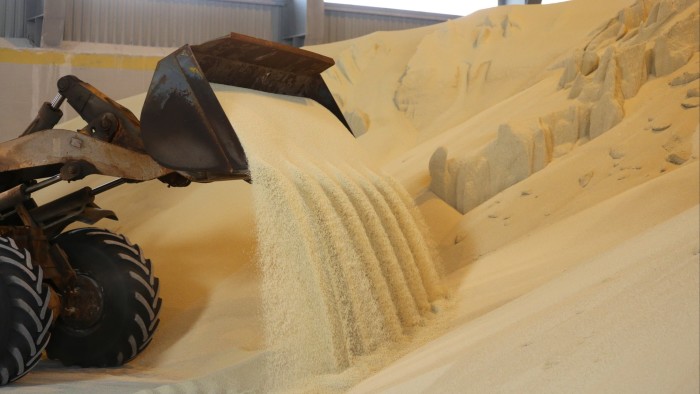Unlock the Editor’s Digest for free
Roula Khalaf, Editor of the FT, selects her favourite stories in this weekly newsletter.
Tariffs to stop Russia from dumping cheap fertiliser into the EU market are “too little, too late”, European producers have warned after a collapse in their earnings in recent years as their costs soared.
Blocked from selling pipeline gas into the EU in the wake of its full-scale invasion of Ukraine, Russia has instead used the gas to increase its production and exports of fertiliser, which is not subject to sanctions.
“It is textbook dumping,” said one fertiliser executive, who asked not to be named.
Crucial for global agriculture, fertiliser is heavily reliant on natural gas as a feedstock, leaving European producers struggling to compete amid stubbornly high gas prices.
The European Commission on Tuesday proposed a gradual increase in tariffs on certain fertilisers from Russia and Belarus over the next three years from the current level of 6.5 per cent. The plan, which will now be voted on by the European parliament and Council of Ministers, has been carefully calibrated to avoid upsetting countries such as France and the Netherlands that have large farming industries.
However, the move did not satisfy the region’s fertiliser companies, many of which are in severe financial distress.
“The EU has dragged its feet on action,” said Svein Tore Holsether, chief executive of Yara International, a leading producer of nitrogen-based fertilisers based in Norway whose net income plunged 98 per cent to $54mn between 2022 and 2023. “Now an extended phase-in period only kicks the can further down the road as it will only start impacting the agricultural season from 2026 and even 2027.”
Holsether called on the EU to “increase the ambition level”, saying tariffs would help level the playing field, “but unfortunately it is too little, too late”.
Ahmed El-Hoshy, chief executive of Fertiglobe, a fertiliser company based in the United Arab Emirates, said ahead of the new EU proposals that crop nutrient producers in Europe were “facing higher labour costs, higher energy costs, higher regulation — something has got to give”. He added that tariffs “would have a big effect on the European landscape to protect industry”.
He said the US had meanwhile urged its farmers to take advantage of the situation to buy more cheap fertiliser and lower their cost of production.
Holsether warned that with natural gas prices in Europe “345 per cent higher than in the US, and even more compared to Russia”, European producers could be tempted to shift their operations across the Atlantic.
He also said the European fertiliser sector would not easily recover from a decline in production.
“These industries are not like restaurants during Covid, where you shut down and then reopen when circumstances change,” said Holsether. “When you move production elsewhere and invest in new facilities, they stay. It’s not like you then go back.”
The commission said the proposed new tariffs would apply to the 15 per cent of agricultural products from Russia for which import duties had not already been increased. “Such imports, particularly of fertilisers, make the EU vulnerable to potential coercive actions by Russia and thus present a risk to EU food security,” it said in a statement.
Under the commission’s proposal, additional tariffs on Russian and Belarusian fertiliser would start at 13 per cent and reach 50 per cent over the next three years to give farmers time to find alternative sources. This is on top of the 6.5 per cent existing duty.
Leo Alders, president of trade body Fertilizers Europe, urged Brussels to raise tariff levels to a minimum of 30 per cent and increase them further every six months.
“While we strongly support the course of action, the urgency of the current landscape demands a more ambitious approach,” he said.
Additional reporting by Andy Bounds in Brussels
Read the full article here




